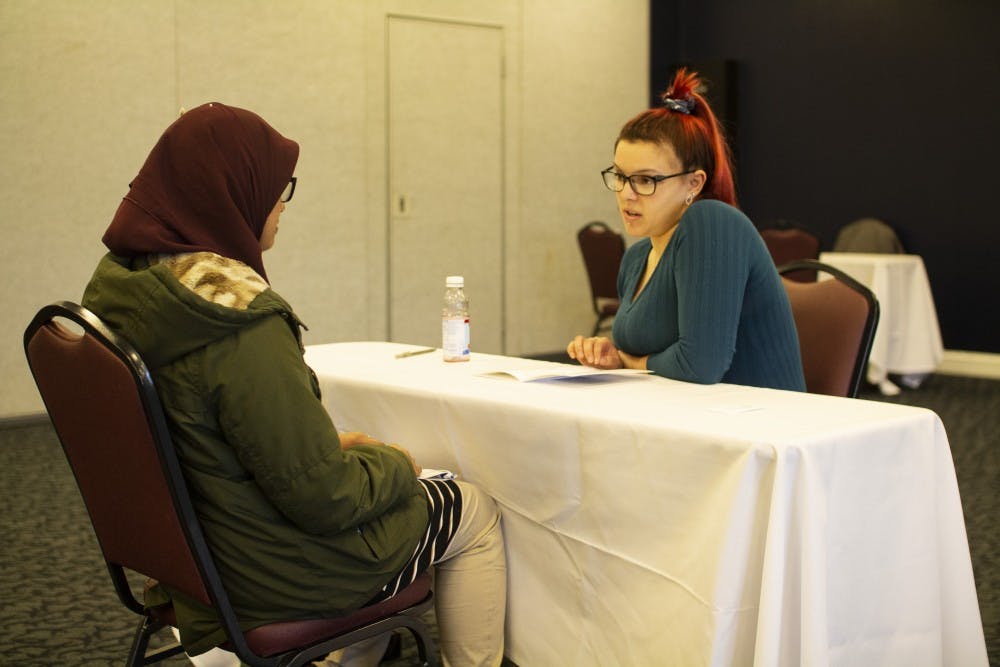Logan Smith-Carlos, a Hamburg native and high school sophomore, recalled a time in middle school when he ran away from home and found himself sitting on a bridge watching a “beautiful” sunset.
“In that instance, I seriously thought about ending my life,” he wrote for the event.
Smith-Carlos has been diagnosed with Obsessive-Compulsive Disorder, Attention Deficit/Hyperactivity Disorder and depression since late middle school.
Smith-Carlos said he now deals with his depression much better and shared his experiences at UB’s Human Library Project on Sunday. The one-day event, held in the Center for Tomorrow, had a group of speakers hold one-on-one meetings to share their personal stories.
The speakers, who “transformed” into and acted as “books,” according to event organizer Erica Goddard, gave first-hand accounts of their personal battles and lives with regard to mental health. Sunday’s Human Library, Breaking Down Barriers, included 11 speakers and covered topics from Post Traumatic Stress Disorder to Gender Dysphoria.
“We’re trying to give people the opportunity to share their experiences in conversation to increase the amount of empathy,” Goddard, an instructor for the department of psychology, said. “It’s different to read about something as words on a page or even in a case study, than it is to sit down and see a real human who is impacted by these things.”
Goddard said people have organized human libraries around the world, but Sunday’s was the first one at UB. She thinks all human libraries share the goal of trying to spread awareness for social issues, no matter the topic it’s intended to address.
UB’s Human Library had participants reserve time with one of the “books” in a waiting area, while they held their one-on-one discussions in a large room next door. Goddard compared it to the Silverman Library specialty collection reservation system.
“[The books] are the connection that you can have between those ideas and the actual experience,” Goddard said. “When you put things on a page, it sounds very cut and dry and very easy to understand. But humans are complex and difficult to understand. So by taking it off the page and making it another person, it really has that benefit of creating a deeper understanding.”
Smith-Carlos said he signed up and heard about the event through his aunt. Though he still thinks he is “noticeably younger” then most of the speakers, Smith-Carlos said having a diverse group of issues and demographics represented is important for the event.
Goddard said she recruited speakers by contacting people she knew who felt comfortable telling their stories.
“We always make sure that the books have the support of family or counseling before they come. Someone can have a terrible time reliving these things and we want to make sure the help they deserve is there.”
Nancy Cook, a psychology professor, went to the event and offered her students extra credit to attend. Cook said the event was exciting and thought the one-on-one discussions are a unique approach to libraries. She thinks if human libraries were more common at UB, it would be good for the school.
“This is so needed, not just to listen to each other but to listen to people who are different from us is a worthy cause,” Cook said. “We have had conversations at UB before, but this gives a platform to people who want to speak without an added hassle of planning. It’s a day set up to give those who want to be transparent a real chance to address others.”
Goddard said she hopes to do more human libraries and make them a regular occurrence at UB.
The National Suicide Prevention Lifeline phone number: 1-800-273-8255
Thomas Zafonte is the senior features editor and can be reached at: thomas.zafonte@ubspectrum.com and on Twitter @Thomas_Spectrum.
Thomas Zafonte is a senior English major. He is a UB sports fan and enjoys traveling around Buffalo.






